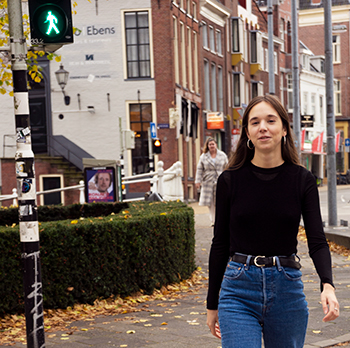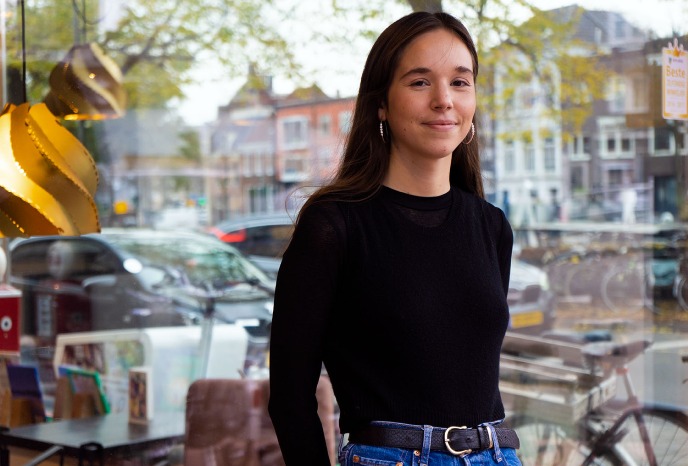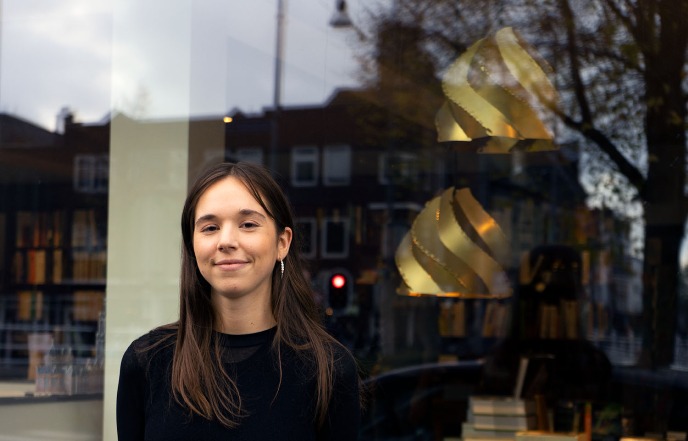Talking differently about feminism

As a PhD student involved in an interdisciplinary UG project, Ruby Schofield is conducting research on the concept of women’s empowerment at the faculties of Philosophy and Arts. Her research focuses on a shift in our concept of what empowerment is. Whereas the discourse around this topic used to focus primarily on women’s struggle for empowerment, these days, it is increasingly shifting to women who are already empowered. Unrightfully so, in Schofield’s opinion.
Text and photos Merel Weijer, Communication office
Odd woman out
Ruby Schofield (24) still doesn’t feel quite at home at the Faculty of Philosophy. She’s the odd woman out in her academic environment because she doesn’t have a Bachelor’s degree in Philosophy. As a result, Schofield often suffers from ‘imposter syndrome’: in a room with 10 other philosophers heatedly discussing the ancient Greeks, she’d rather quietly disappear into the background. She ended up at the UG’s Faculty of Philosophy through a series of detours, where, since September 2021 she has conducted research that has now also brought her to the Faculty of Arts.
Is it fun? Absolutely. At first, she was afraid that working in two places might make her feel lost, but it hasn’t, largely because she has only one main home (Philosophy). Her main interest clearly lies in philosophy, but she also enjoys looking beyond her discipline, thus keeping herself out of the philosophical ivory tower.

Mainstream feminism
Schofield first worked on applied ethics in Utrecht, where she did her MA thesis on feminist philosophy. She continued with this subject when she came to Groningen. In her research, she hopes to do two things. First of all, to challenge that mainstream ideas about feminism that appear in self-help books and on social media. Secondly, to revise the concept of empowerment. These days, the popular way to be a woman is to be ‘empowered’: self-confident and assertive. This narrative is faulty, says Schofield. ‘People like to believe that every choice a woman makes is an “empowered” choice, but that is not the case.’
Breast implants not a free choice?
Schofield quotes author Clare Chambers saying: ‘Until breast implants seem as peculiar as knee implants, we cannot say that a woman chooses to have them for reasons divorced from patriarchy and thus that her decision is irrelevant to justice’. According to Schofield, mainstream feminists would have us believe that women are always strong, independent, outspoken, and no longer victims. ‘However, this is not an accurate reflection of reality, which is that women’s agency is still shaped, to some extent by oppressive patriarchal forces’ she says. ‘We need to have nuanced conversations that draw attention to the fact that choices are often dictated by social norms, rather than authentic preferences, whilst also respecting and doing justice to women’s agency’.

The dominance of the individual on Instagram
Schofield is most interested in how people talk about things. She believes that the way people talk about political and social issues on social media platforms like Instagram, TikTok, and Twitter can do more harm than good Large-scale political issues are often depoliticized by approaching them from an individualistic perspective. Schofield would like to offer a different perspective, one that challenges the hegemony of Instagram, where the individual always takes centre stage. ‘People have a social responsibility; we’re all part of a larger social collective.’ Instagram and other social media platforms have become a channel for talking about political and social issues. Schofield’s generation is very politically aware and uses social media to express themselves around political issues.
Schofield: ‘I think this is a good thing, and something we should hold on to in future. But we can only do so if we learn to talk about these issues differently.’
Silence is violence
Together with a friend, Schofield has created and manages an Instagram page, The Office Girl, which she uses as a platform to address current political issues in the UK. With The Office Girl, she hopes to offer different content than what is usually available on Instagram, thereby challenging the platform itself. Schofield is frustrated with Instagram, for example its role in the Black Lives Matter discussion. ‘There was a strong sense that you absolutely had to post something on the topic, as a kind of duty. Otherwise you were considered ignorant or accused of “silence is violence”. But this actually led to an incredible number of senseless things being posted about the topic. Schofield:“In a way, it’s good that there’s some kind of pressure to be involved, but on a medium like Instagram, it’s really hard to express nuance.”
Tilling potatoes
Her passion for gender and feminism has only grown with the years, to the point where she’s consumed by it. It starts in the morning, as she listens to three podcasts on feminism on her way to work. She works on the topic all the day at work, listens to more podcasts as she cycles back home, and in the evenings, she talks about it with her boyfriend, who is getting a bit tired of it. She sometimes cannot believe her luck at being here and being allowed to work on something she’s always been so passionate about. She used to work for a fruit and vegetable company in Sheffield, which seamlessly matched her values at the time, but she would spend entire days tilling potatoes and fantasizing about how amazing it would be to do research. She is incredibly grateful for her research position, and even though she still feels like a newbie, the fact that she was offered this job has given her self-confidence and a boost. In the coming four years, she will continue to work on her research. Her dream for the future: an academic career in feminist philosophy.
More news
-
15 September 2025
Successful visit to the UG by Rector of Institut Teknologi Bandung
